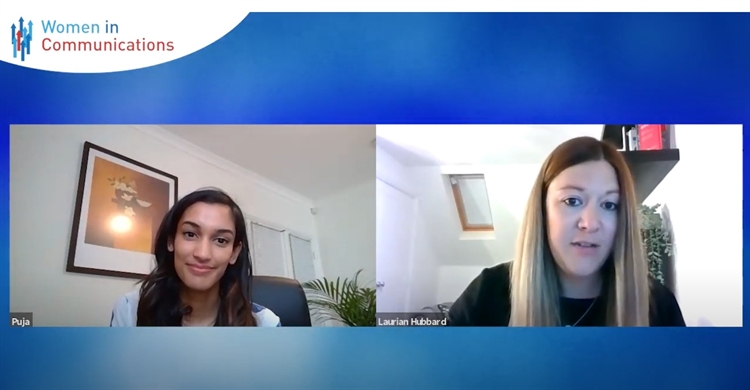Thu 10 Aug 2023
 L-R: Puja Parmar, The Mayor of London's marketing and communications adviser, and Laurian Hubbard, Head of Engagement Services at Welsh Parliament, who returns in September as Chair of our Women in Communications
L-R: Puja Parmar, The Mayor of London's marketing and communications adviser, and Laurian Hubbard, Head of Engagement Services at Welsh Parliament, who returns in September as Chair of our Women in Communications
The next Women in Communications event takes place on 26 September, in partnership with PRCA and CIPR. Here, we look back on lessons we learned from The Mayor of London's marketing adviser Puja Parmar.
Puja Parmar, a senior marketing and communications manager at the Greater London Authority, leads a team of campaign managers responsible for delivering communications and campaigns to Londoners on the mayor's priorities. She believes that taking a step back to think strategically can help budding female leaders break down glass ceilings, something she explained at one of our events in the Professional Women Series. Speaking at Women in Communications, she talked about self-awareness and how it paves the way for people to achieve their full potential and that it can be used to help women step back and think strategically.
She explained that self-awareness can help women in many ways, including making better decisions, building stronger relationships, becoming better leaders, achieving a work-life balance, and dreaming bigger. "Self-awareness allows us to understand our strengths, weaknesses, triggers, and motivations, which we can then leverage to improve and achieve our goals," she said.
Parmar asserted that fear of making the wrong decision can lead to indecisiveness. Self-awareness is one tool to tackle this fear. "Understanding what triggers our indecisiveness, like perfectionism or people pleasing, can help us make decisions and trust the process," she explained.
Understanding self-awareness
Self-awareness is understanding what is happening within us to guide us to improve. "Self-awareness is the conscious knowledge of your character and feelings," said Parmar, adding that self-awareness is seeing yourself clearly and objectively, understanding why you feel what you feel, and behaving in certain ways. "Understanding how you think at a primal level—your thoughts, feelings, belief systems, responses, ways of relating to people—allows you to understand what drives your daily and your working lives so that you can focus on what you can improve," she added.
Benefits of self-awareness
Parmar explained that self-aware leaders enjoy many benefits, from better decision-making to stronger relationships and life-work balance. "Understanding the conscious and subconscious drivers of our decisions can help us make wiser choices aligned with our goals," she said.
When it comes to relationships, self-aware leaders understand themselves and others, which helps them respect differences and work effectively together. "Self-awareness of strengths, limitations and values helps us lead teams effectively and build trust," she added, noting that understanding how we work best and what stresses and relieves us helps manage multiple roles.
"In turn, self-acceptance reduces the power of failure, allowing us to take more risks and pursue bigger goals," she said. For Parmar, when setbacks are grounded in self-awareness and acceptance, they are not seen as a reflection of our intrinsic value, and that's key to enabling women to dream big.
Parmar says that to dream bigger and take more risks, we must be okay with making mistakes and failing. "The reason people don't take risks is often the wrath of our inner critics," she said. "We need to create a positive inner voice and forgive ourselves. There is no such thing as a "bad" or "wrong" decision, only decisions based on the information we had at the time, and these are "wise" decisions."
She also asserted that people don't relate to "perfect" people, so making mistakes makes us seem more human and relatable. "Self-awareness and self-acceptance allow us to get back up after failure because it's not seen as a challenge to our core value. This approach allows us to take more risks and pursue bigger goals," she said.
Self-awareness checklist
Below are Parmar's top tips to become more self-aware:
- Find your purpose: understanding your biggest motivation and broader goal helps you ground yourself.
- Work out your unique strengths: asking others to describe you in three words can reveal strengths you were unaware of.
- Meditate, journal, and notice things more; you will become more aware and find patterns.
- Do personality quizzes like the Myers–Briggs Type Indicator: this test can reveal more about your preferred working style, strengths and triggers.
- Make a thorough list of all your qualities: mixing up strengths and weaknesses helps you see yourself as a well-rounded person and gain self-acceptance.
- Remember weaknesses are often overdone strengths: reframing "weaknesses" this way helps you manage rather than change them.
- Question your thoughts, feelings and decisions: curiosity about your nature can reveal drivers and predispositions.
The next Women in Communications is in London on 26 September. Lisa Hunter, Deputy Chief Executive at Government Communication Service, is a keynote speaker, and she will join us with a presentation full of insight and hands-on advice to help women be their best.
See the agenda and secure your place today!
ABOUT THE AUTHOR
Murielle Gonzalez, content strategy manager at Dods Diversity & Inclusion, is an experienced journalist and editor. She can be reached on the email murielle.gonzalez@totalpolitics.com.
View all news